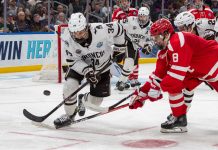TAMPA, Fla. — With Cornell’s defeat at the hands of Ferris State in Green Bay two weeks ago, it was ensured that only two teams would finish the 2011-12 season with a victory: the tournament champs (Boston College, as it turned out) and … Northeastern.
The Huskies edged Boston University 5-4 in overtime in the regular-season finale, but lost the tiebreaker with Massachusetts and thus finished ninth in Hockey East, which has an eight-team playoff format.
This was the first time since the ’04-05 season (and only the second time in the last decade) that only two teams finished the campaign with victories. There are usually three or more teams that finish with wins, since the ECAC Hockey and CCHA tournaments feature consolation games. Since 2001-02, the most teams to go out with a W was six, in ’08-09.
Old-boys club
No program has won it all in its first title game appearance since Maine in 1993. No program has claimed the crown in its first Frozen Four appearance since Lake Superior State, back in 1988. Ferris and Union each entered the weekend with those accomplishments in mind, but alas, it’s another year of experience trumping novelty.
First time for everything
This Bulldogs hockey team became the first FSU athletic program to compete for a national championship.
Piling on
In its three most recent trips to the Frozen Four (2008, ’10, and ’12), Boston College has out-scored its opponents 32-5.
Lucky No. 7 indeed
Saturday marked the second time that BC took the trophy on April 7. The Eagles’ 2001 triumph over North Dakota in Albany, N.Y. was the program’s first national championship since 1949; this is the school’s fourth in the last 11 years.
Kicking it up a notch
Boston College’s Class of 2012 went 22-2 in the postseason, and York’s 37 career NCAA wins are the most in Division I history.
Golden
The Eagles went 9-0-0 this season when wearing their new gold jerseys.
In good company
Goalie Parker Milner finished the 2011-12 NCAA tournament with a 0.982 save percentage, good for third all-time (one can only imagine what it must take to finish first or second.) That said, it is the best save rate since 1972, as well as the best since the field expanded beyond four teams in advance of the 1978 postseason. Milner’s 0.50 goals-against average in this year’s tourney ties him for the best all-time, with BU’s Tim Regan (1972), Denver’s Gerry Powers (1968), and some guy by the name of Ken Dryden (Cornell, 1967). Note that all three of the latter netminders earned their .50 in the paltry four-team format.


